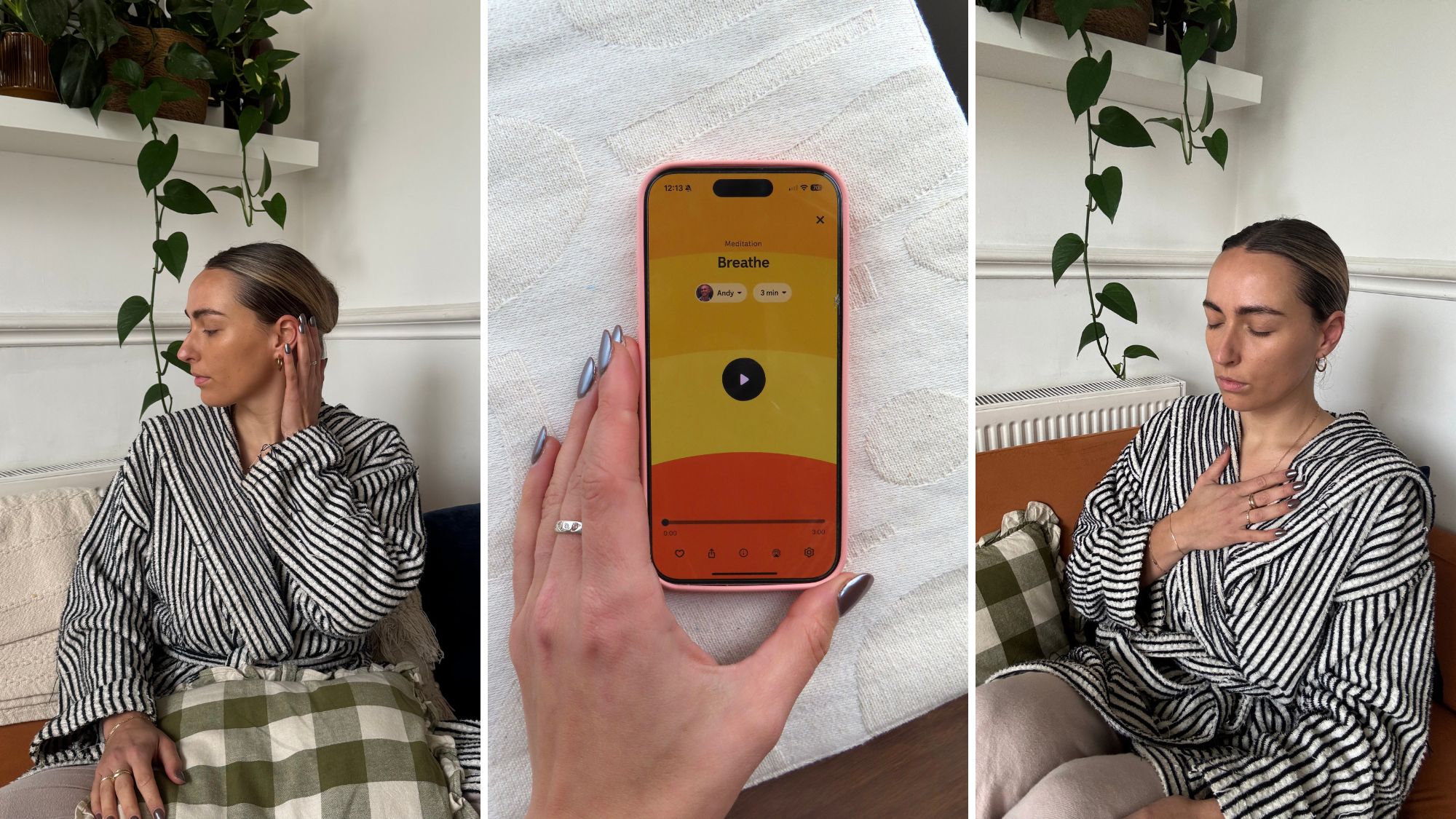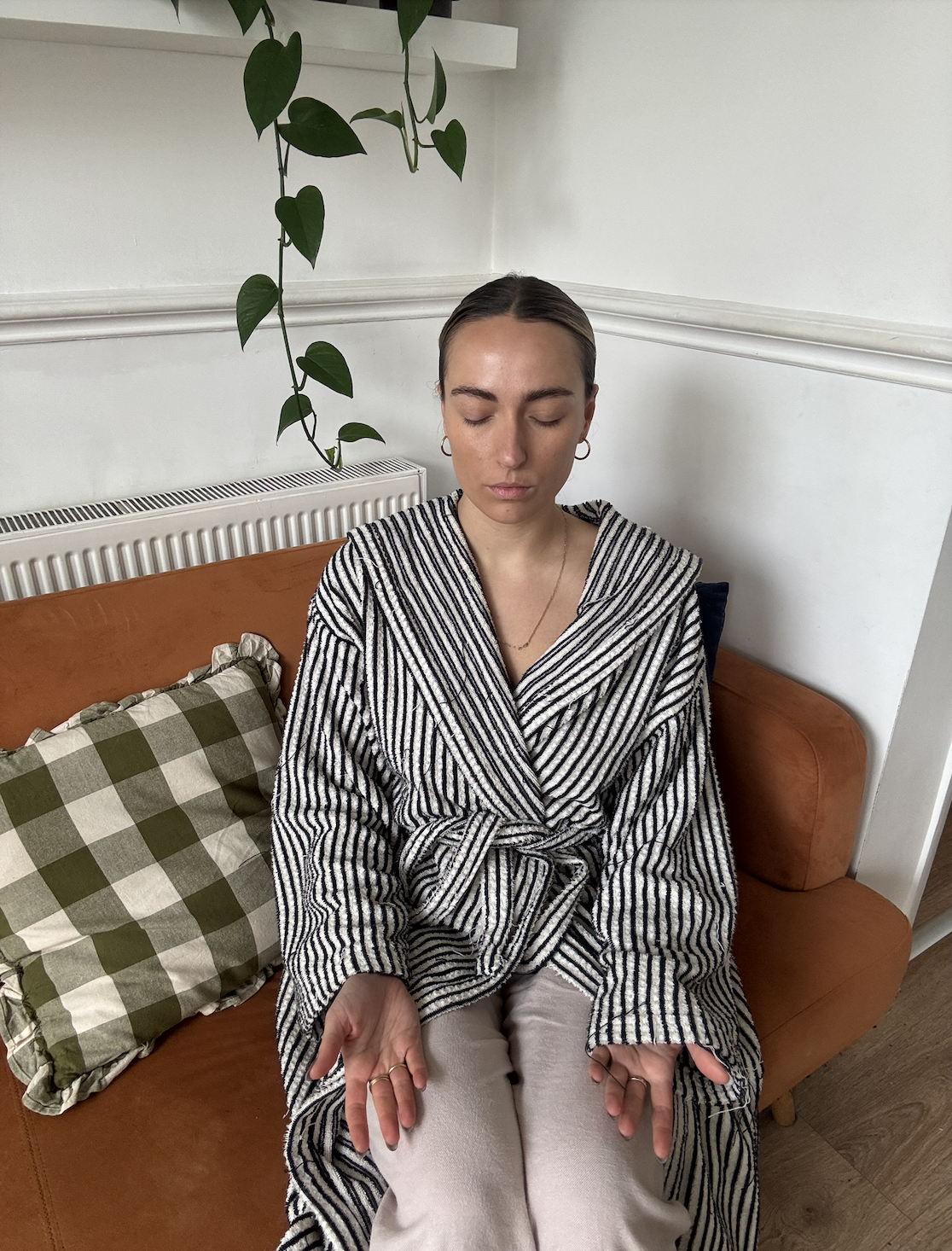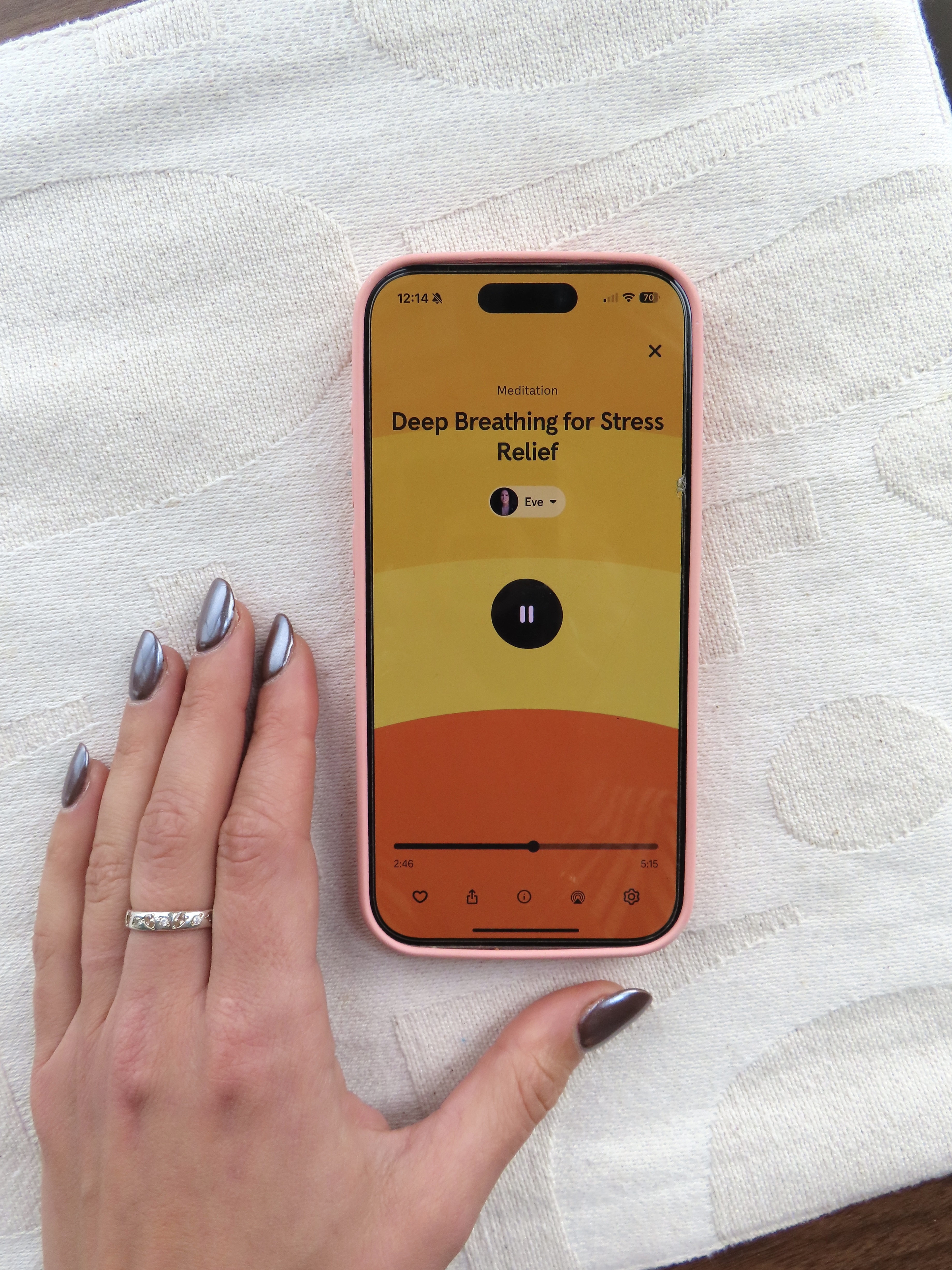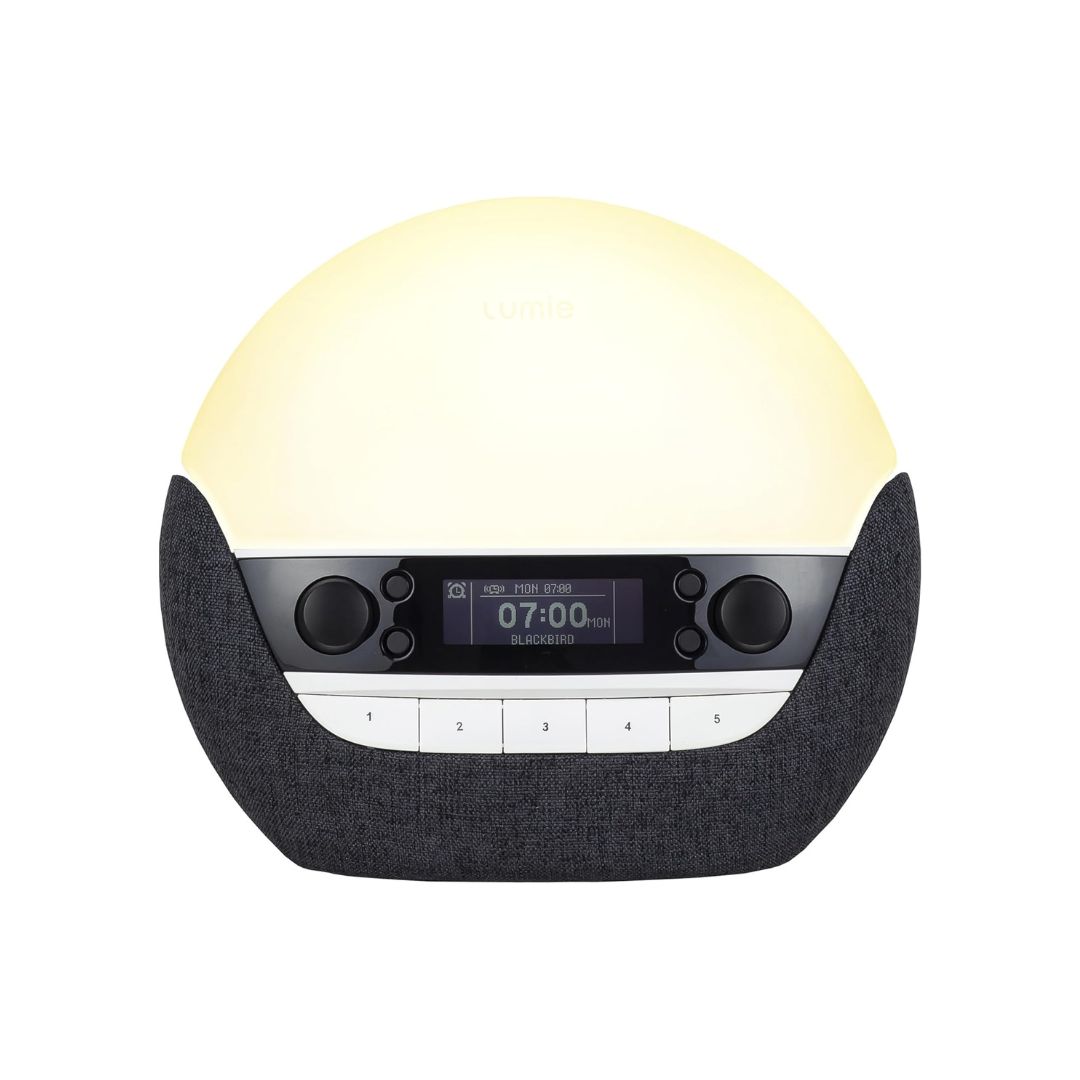I Tried a Five-Minute Morning Meditation Every Day - And I Can’t Believe The Difference In My Stress Levels
As a meditation sceptic, I'm surprised at how even the smallest changes sometimes reap the biggest rewards.


Celebrity news, beauty, fashion advice, and fascinating features, delivered straight to your inbox!
You are now subscribed
Your newsletter sign-up was successful
I’m aware that I'm lucky to have made it to my late twenties without having suffered any major mental health setbacks. For the most part, I’m fairly even-keeled, but shortly after the clocks turn back each winter, I notice my mood shifts. There's something about the shorter days, the amped up social plans, the dark, gloomy mornings, the creeping pre-Christmas money stress and the race to meet end-of-year deadlines that often leaves me feeling like a frayed knot, one pull away from snapping.
I'm not alone in my feeling of overwhelm. A UK-wide stress survey found that 74% of adults have felt so stressed at some point over the past year that they felt unable to cope, with 81% of women reportedly feeling overwhelmed or unable to cope due to stress, compared to 67% of men.
Keen to calm my hyperactive nervous system, I felt like meditation was a good place to start. Research shows that the practice can significantly reduce cortisol, blood pressure, heart rate, and other markers of stress - indeed, the benefits of meditation extend beyond just spirituality.
What I didn’t realise, however, is that meditation doesn’t always require a 60-minute session, incense, or a silent retreat. According to Dora Kamau, mindfulness and meditation teacher at Headspace, “The mind responds best to what we do consistently… a daily five-minute practice can strengthen focus, steady emotions and gradually rewire the habits that keep you distracted or depleted.”
So I committed to it: five minutes every morning for a month. The results, especially for someone who often struggles to fall asleep and wakes up with an elevated heart rate, were genuinely surprising.
Keep reading to find out more, but while you're here, don't miss our guides to sleep meditation, eyes open meditation, body scan meditation, and trending TikTok guided meditations, not forgetting Gwyneth Paltrow's favourite, transcendental meditation.
Is Five Minutes of Daily Meditation Really Enough To Combat Overwhelm? Experts Seem To Think So
What Are the Benefits of Meditation?
Meditation’s benefits sit at the crossroads of ancient wisdom and modern neuroscience, which is exactly why it’s become such a mainstay in contemporary wellbeing.
Celebrity news, beauty, fashion advice, and fascinating features, delivered straight to your inbox!
Physiologically, meditation helps down-regulate the stress response. Regular practice can lower cortisol, reduce blood pressure, and shift the nervous system from “fight-or-flight” to “rest-and-digest.” This is the transition Josh Barrow, acupuncturist at The HVN, sees firsthand: “We’re constantly fuelled by adrenaline. Taking a moment to pause helps suspend that fight-or-flight mode, allowing the body to enter a state of rest and digest.”
But this adrenaline is also why so many people struggle to switch off in the first place. As Dr Galyna Selezneva explains, difficulty settling into meditation isn’t a personal failing; it’s often a sign that the nervous system is stuck in a heightened state. “When the body is in fight-or-flight, the mind will naturally resist stillness,” she says. “I encourage my patients to start with micro-practices - a minute of slow nasal breathing, relaxing the jaw, placing a hand on the chest. These cues signal safety to the brain.” In other words, once the nervous system softens, meditation stops feeling impossible and starts feeling like relief.
On a cognitive level, meditation supports emotional regulation, clearer thinking and improved memory. “Three major regions of the brain benefit most clearly from consistent practice,” explains Kamau. “The amygdala, which drives fear and reactivity, quietens. The prefrontal cortex - home to planning, decision-making and impulse control - strengthens. And the hippocampus, responsible for learning and memory, becomes more robust.”
The result? Less reactivity, more clarity and an increased ability to meet daily life from a steady, grounded place.
What Happens to the Body and Brain During Micro-Meditations?
Even a five-minute meditation session sets off a cascade of physiological changes.
The parasympathetic nervous system (PSNS) is the first to respond. “For me, it’s all about the parasympathetic system,” Barrow says. “Your breath deepens, your heart rate shifts, and you feel less reactive.” This often happens within minutes - and research supports this, with studies showing short meditations can reduce mind-wandering by 15% and lower stress markers almost immediately.
In the brain, those small pockets of focused attention are enough to activate neuroplasticity - the brain’s ability to reorganise itself. “Meditation doesn’t just strengthen key areas of the brain, it protects them,” says Kamau. “Over time, people notice sharper memory, clearer thinking and a greater ability to regulate their emotions.”
Think of micro-meditations as reps in the gym: short, consistent pulses of training that build strength over time.
Is Just Five Minutes of Practice Enough to Make a Difference?
“Yes - but only if it’s repeated,” Kamau emphasises. “A single five-minute practice won’t change your entire day, but daily five-minute practices absolutely can.”
Consistency is the key. Regular short sessions help nudge the nervous system into a calmer baseline and strengthen the brain regions responsible for focus, resilience and decision-making. Barrow agrees: “There’s no right or wrong way to meditate - the evidence you need is how you feel. Even a short practice can intercept the stress response before it spirals.”
Short daily meditations have been shown to improve moment-to-moment awareness, reduce emotional reactivity, and build a sense of internal spaciousness - all of which play directly into managing anxiety.
Who Is Daily Meditation Good For?
The beauty of five-minute meditations is that they’re accessible to almost anyone, especially those who feel too busy or too overwhelmed to start.
Meditation is particularly beneficial for:
- People who wake up anxious: “A brief morning meditation helps you reconnect to the present moment,” says Barrow. “It can make the rest of the day feel more manageable.”
- Anyone navigating stress or emotional overload
- Beginners who find longer sessions intimidating
- People trying to build a sustainable wellbeing habit
And, crucially, it doesn’t have to be at the same time every day. “Sometimes morning is great, sometimes the train, sometimes after work,” Barrow says. “It’s about small rituals repeated consistently.”
I Practiced a Five-Minute Meditation Every Morning for a Month - and My Anxiety Levels Are, in a Word, Transformed
Weeks One To Two
I wish I could tell you I took to meditation like a duck to water, but the truth is, I spent most of the first two weeks thinking about everything except meditation. I didn’t use guided sessions to start with - partly out of stubbornness, partly because I assumed five minutes was too short to need help - and instead just sat quietly with my thoughts. And by “quietly,” I mean not quietly at all.
My brain treated those early sessions like a brainstorming meeting. Did I reply to that email? Does that invoice look passive-aggressive? Should I defrost something for dinner? Why is my left toe tingling?
There were days I opened my eyes at the five-minute timer and realised I hadn’t “meditated” at all, I had simply thought, uninterrupted, for 300 seconds.
This is completely normal, according to Kamau. “We’re training the mind, so of course it wanders. The key is repetition - the mind responds best to what we do consistently.” Even so, I found myself frustrated. Meditation is hard in a way that feels very… revealing. You realise how loud your internal world is.

Georgia would meditate first thing in the morning, often still in her pyjamas.
But small changes still crept in. I began noticing my reactions more - not changing them yet, but becoming aware of the spikes of anxiety I normally barrel past. My mornings did feel fractionally slower, and I enjoyed feeling like I had already achieved something before the day had even started.
Then, mid-way through week two, something clicked: maybe trying to muscle through meditation unguided was like learning to drive without an instructor. That’s when I turned to guided sessions - and everything shifted.
Weeks Three to Four
Switching to guided meditations was like flipping a switch. Instead of wrestling with my thoughts, I finally had something to anchor them. I used Headspace for most of these sessions, leaning into Kamau’s emphasis on “the repetition that strengthens focus and steadies emotions.”
Guided meditations gave my mind direction. In those five minutes, I paid attention to my breath, to the feeling of my feet on the ground, to the parts of my body holding tension. Barrow’s words rang in my head: “A moment to pause helps suspend that fight-or-flight mode.” And I could feel that happening - my chest loosening, my breath lengthening, my heart rate no longer doing its frantic morning tap dance.

I found using Headspace's guided meditations much easier than meditating with my own thoughts
It also made sense of something Dr Galyna had told me when discussing her 'Burnout' treatment at The Lanesborough, that guidance isn’t just a nice-to-have, it’s often essential. “Guided meditation is not an add-on; it’s a core therapeutic component,” she explained. “As the LPG VSS sequences work on the body to lower cortisol and enhance lymphatic flow, the guided mindfulness, breathwork, and affirmation work help the mind release fight-or-flight patterns. It creates a synchronised reset.” I found myself thinking about that often, how guidance acted as structure, keeping my mind from being left alone with its own stress loops.
I still had sessions where my mind was a runaway train. But I had fewer of them. Guided practice seemed to gently nudge my brain toward calm rather than asking it to leap there unaided. By the end of week three, I also started noticing changes outside the meditation window. I wasn’t grabbing my phone first thing; I felt less flustered walking into my inbox, and when my anxiety rose, I recognised it faster and reacted to it less.
Kamau’s explanation of neuroplasticity came to mind: “Meditation doesn’t just strengthen key areas of the brain, it protects them.”
My honest thoughts on daily meditation
After a month of committing to just five minutes every morning, I feel noticeably steadier. The stressful elements of life I'm conscious of haven't vanished, but they're no longer the first thing I feel when I wake up.
Meditation hasn’t erased the chaos around me, but it has changed my relationship to it. The five minutes I spend consciously switching off gives me a buffer; a pause, a breath, a moment of perspective before the day begins pulling at me.
If you’re someone who feels overwhelmed, overstimulated or anxious in the mornings, I cannot recommend this tiny habit enough. And guided meditations? A game-changer.
Shop MC Approved Mood-Boosting Favourites This Winter

One of our go-to sustainable interior brands, Piglet In Bed designs 100% linen, OEKO-TEX certified duvet covers, pillows and sheets in a range of beautiful colourways. Creating a home environment that feels calming, cosy and comforting is essential to boosting your wellbeing this winter.

Getting morning light is challenging in the dark months. This new SAD lamp from Lumie is the perfect way to perk up gloomy winter mornings. The Marie Claire UK team has tested it personally and can confirm it's easy to use, stylish in any room, and effective at helping you stave off winter blues.
Can I meditate even if I can't 'switch off'?
You’re not supposed to switch off your mind - meditation isn’t about emptying your thoughts, it’s about noticing them without being dragged around by them. According to Kamau, mind-wandering is completely normal: “We’re training the mind. Of course it wanders.” Guided meditations can make this easier by giving your focus a gentle focal point (like breath, body, or sound), rather than expecting silence from the start.
So yes, even if (especially if) your mind is loud, busy, anxious or chaotic, meditation still works. You’re not doing it wrong. You’re doing it.

Georgia Brown is an award-nominated writer specialising in fashion, beauty, travel, health and fitness. She has contributed to leading titles including Glamour, Women’s Health, Harper's Bazaar and HELLO!, where she formerly held the position of Senior Lifestyle & Fashion Writer.
She’s also the co-founder of run club Sunnie Runners and is a devoted marathoner. With a particular love for sustainable fashion and slow living, Georgia can often be found sifting through London's best vintage stores to find the best pre-loved pieces.
